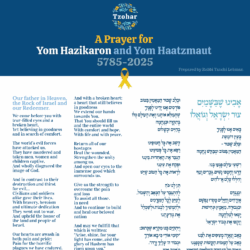A prayer I wrote drawing on Jewish texts about exile and return, for our Palestinian brothers and sisters on Nakba Day.
| Translation (Arabic) | Source (Hebrew) | Source (English) |
|---|---|---|
ربّنا وربّ آبائنا وأجدادنا , الذي استجاب لإبراهيم حين همّ بالتضحية بإبنه , الذي افتقد سارة على باب خيمتها , الذي ظهر لهاجر في برّية شور , وسمع صراخ ابنها في صحراء بئر السبع. تذكّر إخوتنا وأخواتنا الفلسطينيين, الذين قتلوا , هُجّروا وهربوا, ومنعوا من العودة إلى بيوتهم , الذين سيخسرون اليوم بيوتهم . |
אלהנו ואלהי אבותינו, שענה לאברהם בעת עקדת בנו, שפקד את שרה בפתח אהלה, שמצא את הגר במדבר בדרך אל שור, וששמע את צעקת בנה במדבר בְּאֵר שָֽׁבַע, תזכור נא את אחינו ואחיותינו הפלסטינים, שנהרגו, שנעקרו, שברחו, שנאסר עליהם לחזור לביתם, ושעומדים היום לאבד את בתיהם. |
Our God, and God of our ancestors, who answered Avraham when his son was bound on the altar,[1] liturgy, days of awe. who remembered Sarah’s prayers in her tent for a child,[2] Genesis 21:1 and who found Hagar in the wilderness on the road to Shur,[3] Genesis 16:7 and who heard the cries of her child in the wilderness of Beer Shava,[4] Genesis 21:14-17. Beer Shava is not a typo, but both the masoretic pronunciation here, and also contains elements of the modern Hebrew and Arabic names. may He remember our Palestinian brothers and sisters who were killed, who were expelled, who fled, who were not allowed to return home, and those who are still at risk of losing their homes.[5] Yizkor prayer for Nakba day written by Tel Aviv University students. |
إستمع إلى صلواتهم للمّ شملهم في أرض آبائهم . كي يعودوا سعيدين إلى أرضهم . كي نكتب “بسعادة” إلى بيتهم “وبسرور” إلى مدينتهم . |
שמע תפילותיהם לאיחוד משפחות מופרדות באדמת אבותיהם, והם יכולים לחזור באושר לארצם שנכתב ”בשמחה” לביתם “ובששון” לעירם. |
May their prayers be heard so that families be re-united in the land of their ancestors, and they can return in happiness to their land and in joy to their homes,[6] Cf. Festival day Ḳiddush, “בְּשִׂמְחָה וּבְשָׂשׂוֹן הִנְחַלְתָּנוּ” in the cities, in the villages, and outside the villages. |
” لتسكنوا على الارض امنين”, واصعدوا بسلام إلى مدينتكم المقدسة ,ودعنا نسكن سويّة . اَلتَّابعُ الْعَدْلَ وَالرَّحْمَةَ يَجِدُ حَيَاةً، حَظًّا وَكَرَامَةً. |
”וישבתם על הארץ לבטח“ ולעלות בשלום לעיר קודשך, ותן שנגור ביחד. ”בְּצֶ֣דֶק וּבְמִשְׁפָּ֔ט וּבְחֶ֖סֶד וּֽבְרַחֲמִֽים.“ |
May they dwell securely in the land,[7] Leviticus 25:18 without fear of being uprooted, and may they be free to go up to Your holy city[8] A traditional name for Jerusalem that is identical to its Arabic name. and may we all dwell together with righteousness and with justice and with kindness and with mercy.[9] Hosea 2:21 partial |
ضع روح الإخاء والمودّة علينا , كما قيل ” و انزع قلب الحجر من لحمكم و اعطيكم قلب لحم” ونقول آمين |
שים רוח אחוה וחמלה עלינו שנאמר ”והסרתי את לב האבן מבשרכם ונתתי לכם לב בשר.“ ונאמר ”אמן“ |
Help us all to have compassion for one another, as it is written, “and I will take your heart of stone, and replace it with a heart of flesh.”[10] Ezekiel 26:36 and we will say, amen.” |
“A Jewish Prayer for Nakba Day” was written in 2014 by Sarah M. in Hebrew and in English. At our invitation, in 2019 Rasheed Agbaria made an Arabic translation of this prayer for which we are grateful. –Aharon Varady
Notes
| 1 | liturgy, days of awe. |
|---|---|
| 2 | Genesis 21:1 |
| 3 | Genesis 16:7 |
| 4 | Genesis 21:14-17. Beer Shava is not a typo, but both the masoretic pronunciation here, and also contains elements of the modern Hebrew and Arabic names. |
| 5 | Yizkor prayer for Nakba day written by Tel Aviv University students. |
| 6 | Cf. Festival day Ḳiddush, “בְּשִׂמְחָה וּבְשָׂשׂוֹן הִנְחַלְתָּנוּ” |
| 7 | Leviticus 25:18 |
| 8 | A traditional name for Jerusalem that is identical to its Arabic name. |
| 9 | Hosea 2:21 partial |
| 10 | Ezekiel 26:36 |

“תְּפִלָּה יְהוּדִית לְיוֹם הַנַּכְּבָּה | A Jewish Prayer for Nakba Day (يوم النكبة), by Sarah M.” is shared through the Open Siddur Project with a Creative Commons Attribution-ShareAlike 4.0 International copyleft license.










I appreciate your sensitivities to the plight of the Palestinians who left Israel in 1948, but there is a point where our own survival must come first before concentrating on the welfare of others.
To pray that “they can return in happiness to their land and in joy to their homes” is not what any Jew living in Israel can rationally pray for. Perhaps pray that they become integrated into the lands where they currently are living and rise out of severe poverty imposed on them by these countries who use them as pawns. I respect your liberal sensitivities; but not at the expense of my life, the life of my family, and the life of the Jewish People
You’re saying its impossible for Jews in Eretz Israel to live alongside Palestinians in peace? Sounds kinda antisemitic to me–I think as a people we’re more than capable of that.
Beautiful!
I want to bring this to my shul where every time I go there to daven on Shabbes morning I feel torn whether to stand silently, or sit (and learn Torah), or say amen, or leave the room, or make quiet private additions, when prayers are read for the State of Israel, its armed forces, and its captive or missing soldiers.
Thank you, Sarah M.
Our God, and God of our ancestors, bless the Open Siddur Project. Help it become a powerful tool in the hands of Your nation, Israel, to enable them to pray to You from their hearts. Let it not, O Lord, degenerate into a forum for political correctness, where only prayers reflecting the progressive dogmas of the current moment will find a comfortable place. Amen.